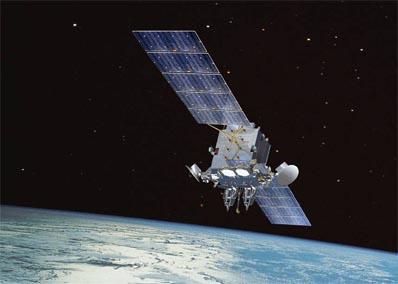



|

|

Advanced Extremely High Frequency (AEHF) System
U.S. AIR FORCE FACT SHEET



Credit: U.S. Air Force
|
Mission/Vision
The Advanced Extremely High Frequency (AEHF) System is a joint service satellite communications system that will provide survivable, global, secure, protected, and jam-resistant communications for high-priority military ground, sea and air assets. Advanced EHF will allow the National Security Council and Unified Combatant Commanders to control their tactical and strategic forces at all levels of conflict through general nuclear war and supports the attainment of information superiority.
Background
The AEHF System is the follow-on to the Milstar system, augmenting and improving on the capabilities of Milstar, and expanding the MILSATCOM architecture. AEHF will provide connectivity across the spectrum of mission areas, including land, air and naval warfare; special operations; strategic nuclear operations; strategic defense; theater missile defense; and space operations and intelligence.
Features
Part of the MCSW's Protected SATCOM Group, the system consists of four satellites in geosynchronous earth orbit (GEO) that provides 10 times the throughput of the 1990s-era Milstar satellites with a substantial increase in coverage for users. First launch in late 2010, AEHF will provide continuous 24-hour coverage between 65 degrees north and 65 degrees south latitude. The AEHF system is composed of three segments: space (the satellites), ground (mission control and associated communications links) and terminals (the users). The segments will provide communications in a specified set of data rates from 75 bps to approximately 8 Mbps. The space segment consists of a cross-linked constellation of three satellites. The mission control segment controls satellites on orbit, monitors satellite health and provides communications system planning and monitoring. This segment is highly survivable, with both fixed and mobile control stations. System uplinks and crosslinks will operate in the extremely high frequency (EHF) range and downlinks in the super high frequency (SHF) range. The terminal segment includes fixed and ground mobile terminals, ship and submarine terminals, and airborne terminals used by all of the Services and international partners (Canada, Netherlands and UK). MCSW is responsible for acquisition of the space and ground segments as well as the Air Force terminal segments. The Army and Navy will acquire their own terminals.
General Characteristics
Primary Function: Near-worldwide, secure, survivable satellite communications
Primary Contractor: Lockheed Martin Space Systems Company
Payload: Onboard signal processing, crossbanded EHF/SHF communications
Antennas: 2 SHF Downlink Phased Arrays, 2 Crosslinks, 2 Uplink/Downlink Nulling Antennas, 1 Uplink EHF Phased Array, 6 Uplink/Downlink Gimbaled Dish Antenna, 1 Each Uplink/downlink earth coverage horns
Capability: Data rates from 75 bps to approximately 8 Mbps
|

|

|

|
|



